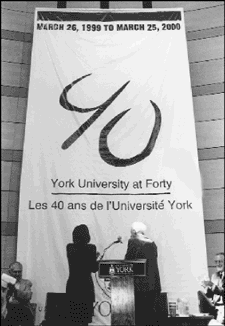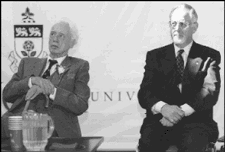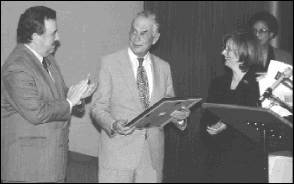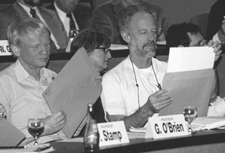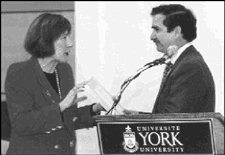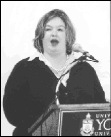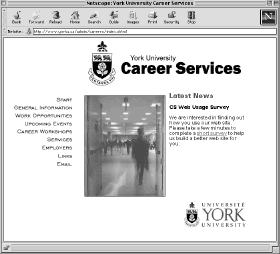
|

|
|
|
|
| | VOLUME 29, NUMBER 28 | WEDNESDAY, APRIL 14, 1999 | ISSN 1199-5246 | | |
|
|
||||
|
|
York President Lorna Marsden, and York's Founding President Murray G. Ross unveiling the 40th anniversary banner in Vari Hall Friday, March 26 marked the 40th anniversary of the founding of York University, and that week launched a year-long celebration of an institution whose diversity, innovation and excellence emerged with dizzying speed over four decades. From an initial class of 76 students in 1960, York has evolved into the third largest university in Canada, attracting over 40,000 students in search of top-notch teaching and research. The commemorations began on March 24th, when D. McCormack Smyth, professor emeritus and senior scholar at York, lectured on the fascinating and feisty story of "The Creation of York University". Smyth, who was also the first Dean of Atkinson College, recounted York's early years and its original emphasis on liberal arts, while remembering the personalities, the problems and the potential of the period. (Smyth's lecture will be the subject of a future article in Gazette.)
On March 25th, The Toronto Star honoured the University with a special eight-page section, "York U at 40: Field of Vision", and banners flying high along streets surrounding the University's three campuses proclaimed the celebration to everyone passing by.
That evening, at the York Senate meeting, members of faculty took time to celebrate as well, and witnessed the induction of the first member of the York University Founders' Society, former York Vice-president Bill Small. Small, who was the University's first comptroller and secretary of the board of governors, served as secretary at York's first senate meeting on November 14, 1960. Professor Maurice Elliott, Chair of Senate suprised the gathering by reading the "complete" minutes of that first senate meeting. The meeting, he explained took only 15 minutes and efficiently took care of the one item of business on the agenda, a skill we might all learn to emulate, he joked.
York's Founding President Murray Ross, and York Chancellor Avie Bennett at the opening ceremonies in Vari Hall. On receiving his membership in the Founders' Society, Small thanked the senate and President Marsden from the bottom of his heart and spoke of the enormous changes that have taken place at York in the past 40 years, saying that it now has a pivotal role to play in the Canadian university community. Six others received their membership in the Founders' Society during the Anniversary celebrations at Founders College on March 26th: Mr. John Armour, first director of the Physical Plant; Dr. Yvonne Aziz, Office of the President, founding support staff; Mr. John Court, a member of the first class and author of the York motto; Professor Norman Endler, founding faculty member; Dr. Allen Lambert, founding board of governors; and Dr. Murray G. Ross, founding president. (Watch for details of these presentations in the next issue of Gazette.)
Bill Small (centre) receiving his membership in the York Founders Society. Presenting the award were Gary Smith, vice president of Advancement and Chair of the 40th Anniversary Organizing Committee (left) and University Secretary and General Counsel Harriet Lewis. The York University Founders' Society is a new honour recognizing those who made major contributions to York during its founding years (1957-1965). These awards will be made on numerous occasions during the 40th anniversary year. Further information is available on the 40th anniversary home page on the York Web site. The next deadline for nominations is September 8, 1999. On March 26, CBC Radio celebrated York's anniversary in two programs. In the morning, Announcer Andy Barrie interviewed founding faculty member Norman Endler, a professor in the Department of Psychology, about his recollections of the early days at York, and in the afternoon Erica Ritter, on "Here and Now", spoke with former York students: David Bell (Class of '62, and now a member of faculty in the Department of Political Science) and Marie Winter (Class of '66).
Members of York Senate receiving certificates of their membership during the 40th anniversary year.
The 40th anniversary launch was marked by a special ceremony in Vari Hall led by Founding President Murray G. Ross, President Marsden and Chancellor Avie Bennett. Also attending were many members of the York community, including student leaders, alumni and pioneers from the first class of students, the first staff, the first faculty and the first physical plant workers. Marsden and Ross unveiled the 40th anniversary banner and called for the 40th anniversary flag to be raised in
(ABOVE RIGHT) President of the York Federation of Students Dawn Palin brought words of congratulations and good wishes from York's undergraduate and graduate students. (ABOVE) York President Lorna Marsden accepting a special commemorative scroll for the University from Councillor Peter LiPreti, on behalf of Mayor Mel Lastman and the City of Toronto.
|
|||
|
|
Shelf Esteem By Michael Todd
The Family Squeeze: Surviving the Sandwich Generation (University of Toronto Press, 1999) by Suzanne Kingsmill and York Professor Emeritus Benjamin Schlesinger. The authors trace the day-to-day life of a typical family caught in the middle who must care for children and elderly parents while trying to manage the stress of full-time jobs. They guide the reader through various scenarios, paying particular attention to the "woman in the middle," who has traditionally been the caregiver to young and old but is now also a full-time member of the workforce. Any person who is, or about to become, a member of the sandwich generation will find this a helpful guide for coping with the conflicting demands of family and work.
The World's Greatest Blackjack Book (Doubleday, 1987) by "Lance Humble" (York Psychology Professor Igor Kusyszyn) and Carl Cooper. This is a revised edition of the blackjack player's bible, featuring the "Hi-Opt 1" - the most powerful simple betting system available today. Blackjack is the only casino game in which a knowledgeable player can gain an advantage over the house. The book has been revised and updated to include the rules of play in Atlantic City as well as the latest information on international playing rules. No matter what your level of experience, the authors promise they will teach you how to make the most money possible playing your cards. Kusyszyn states that this is "the only book that exposes how casinos cheat at blackjack and advises players how to protect themselves. The book contains strategies for both the beginner and the advanced player."
Crown and Ritual: The Royal Insignia of Ngoyo (University of Toronto Press, 1998) by Visual Arts Professor (now deceased) Zdenka Volavka, with introduction and conclusion by Colleen E. Kriger. Edited by Wendy A. Thomas. One day, more than 20 years ago, Zdenka Volavka found a lost treasure: the investiture regalia of the African kingdom of Ngoyo, dating from the Iron Age of the second millennium. The plaited copper crown or "mpu", turned upside down and filled with a jumble of metal objects, was on display in the Musée de l'Homme in Paris, labelled as a "fishing basket". These objects became the focus of Volavka's research in her remaining years, and form the subject of her book. Combining extensive field work with ethnographic, historical, scientific and linguistic analysis, she reconfigures the nature of kingship and royal ritual in Ngoyo, uncovering the objects' true meaning and function, and reintegrating them into their original context. Through the earth darkly: female spirituality in comparative perspective (Continuum Publishing, 1997) by Humanities Professor Jordan Paper. Feminist theory has revolutionized the examination of comparative human culture. In his book, Paper has combined new anthropological and textual materials, re-examined older research, and included the testimony of living women to form a source book of importance to feminists or anyone interested in comparative religion. Paper's most basic contribution is the affirmation of the tremendous diversity provided by the experiences and cultural symbols of women in Northern Europe, East Asia, North America and Africa. Feminists have established that woman-centred alternatives existed prior to patriarchy - a single supreme male deity and female subordination. Paper adds to feminist discourses his own conviction that alternatives continue to survive, sometimes hidden within nominally male-dominated systems. His discussions offer a way for feminists to honour the claims of women from around the world, and leads him to a controversial set of conclusions about the sources of patriarchy itself.
Expanding Our Vision: Insights for Language Teachers (Oxford University Press (Canada), 1999), edited by David J. Mendelsohn, professor in the Department of Languages, Literatures and Linguistics. Expanding Our Vision is a collection of articles by well-known educators in the field of Teaching English as a Second Language. Each article focuses on an inspirational individual outside the field of language teaching who has touched the life of the author and had a decisive influence on his or her thinking and professional work. The book's aim is to open channels to extradisciplinary ideas and expand the vision of language teachers beyond the research world of linguistics and language education. Among the 10 individuals discussed are Joseph Campbell and Jane Jacobs. Mendelsohn contributes a chapter of his own on Janusz Korczak, a director of orphanages and an educator.
|
|||
|
|
By David Finetone
Are you or someone you know at York, still looking for that summer job? Or maybe an associate has asked you how they can recruit some of your brightest and best? There are plenty of opportunities available to be gleaned employers and employees at the York University Career Services (YUCS) Web site (http://www.yorku.ca/admin/careers). Career Services is a multi-faceted resource centre that offers guidance and assistance on how to develop and implement a successful job search strategy, enabling you to create your future based on informed choices. The site is exceptionally easy to navigate and offers static information about services, upcoming events and workshops such as: The YUCS Web site also serves as a gateway for student and alumni access to Campus WorkLink: NGR, where you can also: This service is available 24 hours a day, seven days a week, from any computer with access to the Web. The Career Services site also links to relevant public and private sector sites.
|
|||
|
|
By Michael Todd America's first newspaper, Publik Occurrences, was published in Boston, Massachusets, in 1690. It was four pages long - three with printed news, and the fourth left blank so readers could add their own annotations and then pass it on to a friend. A lot has changed since then...or has it? According to Professor Pablo Boczkowski, maybe not. In 1994, the first newspapers began publishing on the Web. Like its antecedent in 1690, today's online paper shares some of the same attributes - forums, op-eds, spaces for reader feedback, and the ability to forward sections on to friends with your own comments added, notes Boczkowski, a researcher at Cornell University. As part of Atkinson College's Brownbag Research Seminar series, Boczkowski was at York to speak on the world of online news in a talk entitled, "Interactivity as a Boundary Object: On the Relationships Between Technologies, Producers and Users in the Development of Online Newspapers." "It's [online newspapers] a return to the idea of users as consumers AND producers of news," says Boczkowski. "The idea is, there's room for a response. It's not just one-way news." In the classic style newspaper the usual news hierarchy is that only newspaper people manage, control, and shape the news - what Boczkowski calls "centralized construction". But with the Web, he claims, newspapers have moved toward a "distributed" environment. "This challenges the notion of the centralized model. Now editing, marketing and production are carried on with high levels of direct participation from users," he says. Boczkowski notes that this now challenges the traditional "gate keeping" roles or filtering aspects of news creation. A job that traditionally fell, again, to editors. Web pages now are both a carrier and content provider, he says. The New York Times, for instance, has about 170 forums that readers can participate in. In one forum titled, "Is Microsoft a Monopoly?", the Times received about 17,000 postings, or roughly 2,500 new items every week. Boczkowski argues that these kind of forums represent both a news site AND content. Web newspapers have also filtered out into the community, into what are known as community newspapers (as distinct from national or mainstream papers). In New Jersey, three mainstream papers launched a Web site that allowed the community to publish its own news free. In some ways similar to Publik Occurrences 300 years earlier. The New Jersey online community paper now has more than 3,000 groups who regularly contribute news - all joined in the space of six months. "I think what we're seeing with online papers," says Boczkowski, "is that they are moving from publishing their own content, to being publisher of others' content. "Newspapers have been around for 400 years. Until now, very little has changed. The question isn't replacement, it's more how papers and technology are going to coexist."
|
|||
|
|
By Michael Todd
MALLSPEAK. Some US colleges and universities are apparently joining forces in the crusade against "mallspeak," the youth sub-dialect incorporating "like" in several parts of a spoken sentence, reports the Los Angeles Times. Mount Holyoke College and Smith College are two of the first institutions to incorporate speaking requirements in many of their courses. Stanford University and others are considering adopting a speaking curriculum. Source: Los Angeles Times, http://www.latimes.com, 3/22/99. * * * MORE LOONIES BOOST SCIENTIFIC RESEARCH. Aerospace and health research are the biggest beneficiaries of a $1.5 billion boost in the Canadian budget over the next three years. With $430 million for the Canadian Space Agency and $390 million pegged for the new Canadian Institutes of Health Research, the budget announced Feb. 16 is designed to increase innovation and productivity, said Finance Minister Paul Martin. He also allocated $200 million to the Canada Foundation for Innovation, which gives grants for innovative research to universities, hospitals, and research institutes. Technology Partnerships Canada, a loan program for technology research leading to commercial applications, received an additional $150 million over three years, while the Natural Sciences and Engineering Research Council got $75 million. Sources: The Toronto Star, http://www.thestar.com, and National Post, 2/17/99. * * * IN AFRICA, most colleges and universities now have some form of Internet access. But many institutions still need better connections and help finding ways to make those connections useful. While many institutions have seen significant progress, lack of funds hinders efforts to provide Internet access on any mass scale. See April 2 issue of The Chronicle at http://chronicle.com/chronicle. * * * WILL THE REAL SHAKESPEARE PLEASE STAND UP? Was the author of Shakespeare's poems and plays William Shakespeare, the sometime actor and grain merchant from Stratford, or the Earl of Oxford, Edward de Vere, an erudite and well-traveled aristocrat familiar with life in Elizabeth's court, asks the April issue of Harper's. The magazine explores the centuries-old debate with essays by 10 scholars, half of whom argue that Oxford wrote the plays (these advocates are writers and independent scholars), and half who think the traditional attribution to the man from Stratford is correct (this team is dominated by academics). Yale professor Harold Bloom offers a joking theory about the plays' author being Lucy Negro, "Elizabethan England's most celebrated East Indian whore," but in the end, he seems to support the traditional attribution of the plays to Shakespeare of Stratford. Source: Harpers http://www.harpers.org * * * LIBERAL ARTS COLLEGES UNDER ATTACK. Approximately 550 small private liberal arts colleges in the US face serious challenges in the next few years, reports The New York Times. Each year, about six are forced to close. Many others merge with larger institutions to ensure their survival. In addition, their "yield", defined as the proportion of accepted students who eventually enrol, is as low as 30 percent. Ivy League institutions enjoy yields of more than 90 per cent, according to the Times. Some educators are pushing for liberal arts colleges to focus more on practical, job-oriented programs in place of traditional academic subjects. But others warn that such a shift would weaken the distinction between liberal arts colleges and public colleges and universities. Source: The New York Times, http://www.nytimes.com, 3/10/99. In Distinctively American: The Residential Liberal Arts Colleges, 15 college presidents, professors, and notable graduates of liberal-arts colleges examine the contributions of those institutions to American intellectual life and the challenges facing them. Source: http://daedalus.amacad.org/daehome.html. * * * SPACE: THE MOVIE. Astronomers have used images from the Hubble Space Telescope to produce a computer-generated motion picture of the rotation of Uranus and its rings. The movie shows characteristics that scientists say they might never have discerned from still images. * * * A RUSSIAN UNIVERSITY fired four American professors Friday [April 2], in retaliation for the NATO bombings of Serbia, The Associated Press reported. * * * ACADEMIC JOURNALS MOVE ONLINE. In a move that could accelerate the publication of new scholarly research, a few journals are beginning to use the Internet to conduct peer review of articles submitted for publication. And now a coalition of research libraries that is seeking alternatives to high-cost academic journals will offer grants for electronic experiments in new approaches to scholarly communications. For more information see http://chronicle.com/infotech.
|
| ||
|
| Current Issue | Previous Month | Past Issues | Rate Card | Contact Information | Search |
|
